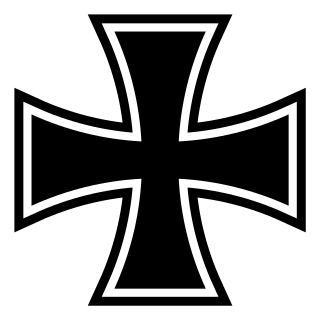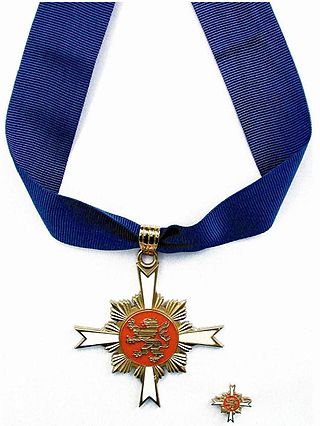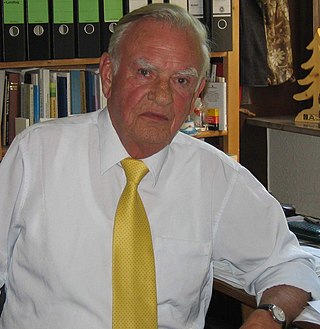
Albert was King of Saxony from 29 October 1873 until his death in 1902.

The Iron Cross was a military decoration in the Kingdom of Prussia, and later in the German Empire (1871–1918) and Nazi Germany (1933–1945). The design, a black cross pattée with a white or silver outline, was derived from the insignia of the medieval Teutonic Order and borne by its knights from the 13th century. As well as being a military medal, it has also been used as an emblem by the Prussian Army, the Imperial German Army, and the Reichswehr of the Weimar Republic, while the Balkenkreuz variant was used by the Wehrmacht. The Iron Cross is now the emblem of the Bundeswehr, the modern German armed forces.

The Order of Merit of the Federal Republic of Germany is the only federal decoration of Germany. It is awarded for special achievements in political, economic, cultural, intellectual or honorary fields. It was created by the first President of the Federal Republic of Germany, Theodor Heuss, on 7 September 1951. Colloquially, the decorations of the different classes of the Order are also known as the Federal Cross of Merit.

The Order of Merit is an order of merit for the Commonwealth realms, recognising distinguished service in the armed forces, science, art, literature, or the promotion of culture. Established in 1902 by Edward VII, admission into the order remains the personal gift of its Sovereign—currently Edward VII's great-great-grandson Charles III—and is restricted to a maximum of 24 living recipients from the Commonwealth realms, plus honorary members. While all members are awarded the right to use the post-nominal letters OM and wear the badge of the order, the Order of Merit's precedence among other honours differs between countries.

The Order of Orange-Nassau is a civil and military Dutch order of chivalry founded on 4 April 1892 by the queen regent, Emma of the Netherlands.

The Royal Norwegian Order of Saint Olav is a Norwegian order of chivalry instituted by King Oscar I on 21 August 1847. It is named after King Olav II, known to posterity as St. Olav.

The Order of the Redeemer, also known as the Order of the Saviour, is an order of merit of Greece. The Order of the Redeemer is the oldest and highest decoration awarded by the modern Greek state.

The Order of Civil and Military Merit of Adolph of Nassau is an order of merit of the Grand Duchy of Luxembourg for meritorious service to the Grand Duke, the Grand-Ducal House and Luxembourg. It was founded in 1858 as a chivalric order of the Duchy of Nassau by Adolphe of Nassau in honor of his namesake and ancestor, Adolf, Count of Nassau, the only member of the House of Nassau to have been Roman King of Germany. After the Duchy of Nassau was annexed by Prussia in 1866 and Adolphe became Grand Duke of Luxembourg in 1890, he revived the order as an order of merit.

The Royal Order of the Polar Star, sometimes translated as the Royal Order of the North Star, is a Swedish order of chivalry created by King Frederick I on 23 February 1748, together with the Order of the Sword and the Order of the Seraphim. The Order of the Polar Star is intended as a reward for Swedish and foreign "civic merits, for devotion to duty, for science, literary, learned and useful works and for new and beneficial institutions".

The House and Merit Order of Duke Peter Frederick Louis or proper German Oldenburg House and Merit Order of Duke Peter Frederick Louis was a civil and military order of the Grand Duchy of Oldenburg, a member state of the German Empire. The order was founded by Grand Duke Augustus of Oldenburg on 27 November 1838, to honor his father, Peter Frederick Louis of Oldenburg. It became obsolete in 1918 after the abdication of the last grand duke.

The Military Order of Max Joseph was the highest military order of the Kingdom of Bavaria. It was founded on 1 January 1806 by Maximilian I Joseph of Bavaria, the first king of Bavaria. The order came in three classes:

The Hessian Order of Merit is a civil order of merit, and the highest award of the German State of Hesse. The order was established 1 December 1989.

The Order of Merit of Berlin is this highest award of the German State of Berlin. Awarded in the name of the Senate of Berlin, the order had recognized outstanding contributions to the State of Berlin since 21 July 1987. Awarded each year on 1 October, the anniversary of the Berlin Constitution, the order is limited to no more than 400 living recipients. As of 2016 the order had been awarded 431 times, to 152 women and 279 men.

The Lower Saxony Order of Merit is a civil order of merit, of the German State of Lower Saxony. The order was established 27 March 1961. The order is presented in three classes, the highest is the Grand Cross of Merit, the next is the Cross of Merit First Class, and the lowest is the Cross of Merit on Ribbon.

The National Order of Merit is a state order of the Republic of Malta. The order is divided into four grades that may be awarded to Maltese citizens.

The Order of Merit of the Free State of Saxony is a civil order of merit, and the highest award of the German state of Saxony. First presented in 1997, it is awarded by the Minister-President of Saxony. The order is presented to individuals who have made outstanding contributions to the people and state of Saxony. The award is limited to a total of 500 living recipients. As of October 2020, it has been awarded 349 times.

The House Order of Henry the Lion In German: Hausorden Heinrichs des Löwen, was the House Order of the Duchy of Brunswick. It was instituted by William VIII, Duke of Brunswick on 25 April 1834. The ribbon of the Order was red with yellow edges. It had five grades: Grand Cross, Grand Commander with Sash, Commander, Knight 1st Class, Knight 2nd Class, plus Medal of Merit for Science and Arts, the Cross of Merit and the Medal of Honour. The Order was named in honour of Henry the Lion, who remains a popular figure to this day.

The Order of Berthold the First was a dynastic order in the Grand Duchy of Baden. It was established on 29 April 1877 by Frederick I, Grand Duke of Baden to mark the twenty-fifth anniversary of his accession as an additional class above the grand cross of the Order of the Zähringer Lion. On his seventieth birthday Frederick I separated it from that order and gave it statutes as an order in its own right. After that date, the order could be given to all persons for faithful service or as a special show of recognition and benevolence.
The orders, decorations, and medals of the German states, in which each states of Germany has devised a system of orders and awards to honour residents for actions or deeds that benefit their local community or state, are in turn subsumed within the German honours system. Each state sets their own rules and criteria on eligibility and also how each medal is awarded and presented. Most of the orders allow for the recipient to wear their orders in public.

Werner Grübmeyer was a German politician. He was a member of the Christian Democratic Union (CDU).



















